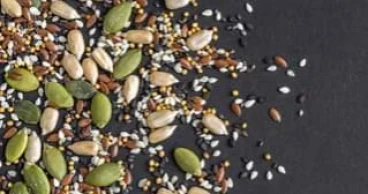immunity
10 Tasty Immunity Boosting Winter Soup Recipes for Children
The chilly weather of winter brings cold waves which can harm children. During the cold months, keeping children safe from flu, colds and other kinds of winter sickness becomes a struggle for their parents. One effective way to enhance a kid’s immune system is by treating it with nutritious homemade soups. Here are some tasty soup recipes that cater to your child's health needs.
10 Delicious Soups to Strengthen Kids' Immunity This Winter
Creamy Broccoli and Cheddar
Enjoy the nutritional benefits of Creamy Broccoli and Cheddar Soup, a blend of fresh broccoli, butter, cheddar, and milk. Rich in vitamins and antioxidants, broccoli enhances immunity. The soup provides essential nutrients, including calcium, supporting bone health. To make this comforting bowl, gently sauté fresh broccoli florets in butter, adding a creamy mix of cheddar and milk until velvety smooth.
This velvety creation is both satisfying and nourishing, offering a wholesome strategy to fortify your child against winter ailments. Incorporating broccoli's goodness, it contributes vitamins A and C. Relish a warm bowl of this nutrient-packed soup, making it a delicious yet health-conscious choice.
Read more: 10 Types of Natural Honey: A Guide to Varieties, Benefits, and Uses
Hearty Chicken and Vegetable
Nourish your child with the wholesome goodness of the Chicken and Vegetable Soup. Packed with essential nutrients, this recipe combines protein-rich chicken with an array of nutritious vegetables like carrots, celery, and onions in a hearty broth. To prepare, gently simmer the chicken with the vibrant vegetable mix until it reaches perfection.
The dish is rich in vitamins such as vitamin A, vitamin K, and vitamin C. These vitamins contribute to a strengthened immune system. Additionally, the soup provides essential minerals like iron, supporting the body's metabolic processes and maintaining energy levels. This nutrient-dense soup is not only comforting on winter evenings but also serves as a robust defence against seasonal illnesses.
Spinach and Chicken Soup
Enjoy the nourishment of Spinach and Chicken Soup, a delicious mixture designed to enhance both taste and health. Combine spinach with chicken for a nutrient-rich infusion. Simmer these ingredients, allowing the flavours to merge into a comforting soup. Serve with lemon.
Read more: Superfoods: Worth the Hype?
Beyond its delicious taste, this soup is a rich source of iron from spinach, essential for maintaining healthy blood. Chicken contributes essential proteins necessary for the growth and immune function of children. Together, they create a fortifying concoction that delights the taste buds of youngsters and strengthens cold resistance too.
Nourishing Coconut Carrot Lentil
Savour the health benefits of Nourishing Coconut Carrot Lentil Soup, combining protein-packed lentils, carrots, and velvety coconut milk for a wholesome infusion. Simmer the ingredients to meld flavours seamlessly. Together, they create a nourishing symphony that boosts your child's immunity, ensuring good health in winter.
This creation acts as a strong defence against winter ailments, with essential proteins, vitamins B and C, and coconut milk adding a creamy texture rich in healthy fats. This nutrient-dense delicious soup provides nutrients, making it a health-conscious choice for your child.
Read more: Prospects of Safe Broiler Chicken Farming
Tomato and Basil Delight
Savour the health benefits of Tomato and Basil Delight Soup, a nutritious fusion designed to boost immunity. Simply combine tomatoes with aromatic basil, simmering until the flavours mix seamlessly.
This soup is a powerhouse of nutrients, providing essential vitamins such as vitamin C from tomatoes. Basil contributes additional vitamins, including vitamin K, essential for bone health. Together, they create a nourishing concoction that supports your child's immune system with every serving.
2 years ago
10 Tasty Drinks to Boost Kids' Immunity This Winter
As winter rolls in, it brings cold waves and fog. In chilly weather, kids may catch cold and fall ill more frequently. However, there are some secret weapons to combat these seasonal maladies: immunity-boosting winter drinks! Discovering tasty and healthy options to fortify children's immunity can make winter an enjoyable journey. Let's explore palatable winter drinks that not only tantalise the taste buds of children but also serve as shields against sickness during the cold months.
10 Delicious Immunity-Booster Winter Drinks for Children
Turmeric Milk
Turmeric milk is known for its medicinal properties. This drink blends the beneficial properties of turmeric and warm milk. To prepare, heat a cup of milk first. Then add half a teaspoon of turmeric powder, a pinch of black pepper, and a dash of honey to the milk. Simmer the mixture for a few minutes, then strain before consumption.
This golden elixir boasts curcumin which is renowned for its anti-inflammatory and antioxidant properties. Consuming turmeric milk helps bolster the immune system, aiding in the prevention of winter ailments like colds and flu. Its natural healing properties provide relief from sore throats, coughs, and other seasonal maladies.
Read more: 10 Types of Natural Honey: A Guide to Varieties, Benefits, and Uses
Vegetable Soup
Vegetable soup, a wholesome blend, incorporates an array of vegetables like carrots, spinach, tomatoes, and onions. Simmer these veggies in a broth, then season with some herbs and spices. This nutritious soup is filled with a plethora of nutrients, vitamins, minerals, and antioxidants, fortifying kids' natural immune systems and aiding in preventing colds and flu.
The warmth, nourishment, and hydration provided by this soup make it an appealing and immunity-boosting choice to keep kids healthy while relishing an appetizing meal.
Orange Carrot Juice
A vibrant and refreshing drink, orange carrot juice is a burst of immunity-boosting nutrients. Combine equal parts of carrot and orange juices for a rich blend of vitamin C and beta-carotene. These ingredients can fortify the immune system, essential in shielding kids from winter ailments.
Read more: Superfoods: Worth the Hype?
The juice's high vitamin content bolsters immunity, warding off cold and flu during colder months. The antioxidants in this juice act as a defence mechanism, aiding in preventing illnesses, while its delicious taste makes it kid-friendly.
Pumpkin Seed Milk
Pumpkin seed milk is another delightful way to keep winter ailments at bay for the little ones. This remedy involves blending soaked pumpkin seeds with water and straining the mixture. Rich in zinc, antioxidants, and omega-3s, it safeguards kids against winter sickness.
This nutritious vegan delight acts as a shield against seasonal ailments by fortifying the body's defence mechanisms. Its high zinc content aids in immune response, while antioxidants combat free radicals. Providing a wealth of nutrients, including magnesium and vitamin E, pumpkin seed milk contributes to overall health, offering an extra layer of winter protection.
Read more: Prospects of Safe Broiler Chicken Farming
Fruit Smoothies
Organic fruits are loaded with vitamins, antioxidants, and essential nutrients. Preparing smoothies involves blending a variety of fruits such as berries, bananas, and oranges, with a splash of yoghurt or milk. Each sip is a celebration of the body's strength.
The fruit medley provides a powerhouse of vitamins C and E, crucial for fortifying their defences and warding off colds. Its richness in antioxidants aids in fighting off infections, ensuring a tasty and convenient way for kids to stay healthier during colder months.
2 years ago
Top 10 Healthy Seeds to Eat
Nutrition plays significant roles for a human’s overall health and mental well-being. Adding seeds to one’s regular diet have numerous health benefits. Let’s discuss different types of seeds and their respective health benefits.
What Are Seeds?
All flowering plants reproduce through seeds. In simple words, a seed is the tiny, round or oval, hard component of a plant that works as the starting point of a new plant. More scientifically, a seed is a small embryonic ‘plant’, surrounded by a protective layer called the seed coat with certain reserved nutrients. In an appropriate environment, each seed has the potential to develop into a new plant.
How Seeds are Different from Nuts, Grains, and Beans
While many confuse seeds, nuts, grains, and beans; they are all different types of plant-based foods with unique characteristics. Though they share some similarities in terms of their nutritional content, they have differences.
Seeds are the reproductive parts of plants with high protein like chia seeds, sesame seeds. They are rich with healthy fats, fiber, vitamins and minerals.
Read More; Sweet Potato Health Benefits: The Organic Affordable Super Food
Nuts are the fruits of certain trees like almonds, peanuts. They are generally high with healthy fats, protein, fiber and various vitamins and minerals.
Grains are actually the seeds of grasses such as wheat, rice. They are a good source of carbohydrates, fiber, minerals and some essential vitamins.
Beans are the edible seeds of legume plants, such as lentils, kidney beans. Beans are nutritious with protein, fiber, various vitamins and minerals.
Each of these foods has unique properties that make them valuable additions to a healthy and varied diet.
Read More: Best and Worst Foods for Brain, Memory, Focus
How to Eat Seeds
Seeds are known as nutritional powerhouse. They are not just delicious and easy to consume but also convenient for people of all ages. Thus, just having proper digestion is not sufficient. It is vital to ensure that these nutrients are absorbed effectively by the body.
The next question that arises is the appropriate way to consume seeds. Eating them raw is the only way to derive nutrition from the seeds. It expands to soaked, ground or mashed particularly when added with other foods.
It is suggested to soak seeds overnight before consumption. Although soaking provides numerous benefits, the most significant is the removal of phytic acid found on them. Overnight soaking is the most effective method for this.
When selecting seeds, raw and unsalted varieties are recommended. Seeds, coated or roasted, or with added sugar coatings must be avoided.
read more: Natural Sweeteners: 7 Healthy Alternatives of Refined Sugar
10 Healthiest Seeds
Seeds may be small in size, but when it comes to nutrition it is packed with vitamins, minerals and healthy fats. This tiny powerhouse can provide the energy needed for the day ahead. In fact, seeds can be nutritious yet satisfying and a delicious filling snack. Here are the 10 healthiest seeds with benefits to boost overall health.
2 years ago
5 Soups to Soothe a Cold
During the winter season, many people suffer from colds and flu. Soups are always soothing and easy to consume for people of all ages. Healthy soups packed with immunity-boosting ingredients not only help fight colds, and congestion but also keep the body nourished and hydrated. Here are 5 healthy soups recipes to cure a cold and fight against the flu and virus.
5 Homemade Soups for Cold and Flue Season
Coconut Ginger Carrot Soup
Ingredients
2 tsp olive oil or water, 1 onion, diced, 3 cloves garlic, minced, 2 tbsp fresh ginger, minced, 1 tsp cumin, 1 tsp coriander, 5 cups peeled and chopped carrots, 3 cups vegetable stock, 1 cup canned full-fat coconut milk, salt, and pepper, as needed
Instructions
First, take a pan, put oil and fry the onion and the garlic. Add a pinch of salt and pepper and cook for 3-4 minutes until fragrant and soft. If you want to prepare oil-free soup, use water or broth in lieu of oil. Then add ginger, carrot, spices, and a pinch of salt and pepper again. Cook for 1 minute and stir constantly. Now add coconut milk and vegetable broth, uncovered for about 20 minutes, and cook as long as the carrots are tender.
When the carrots become tender, remove the soup from the stove and allow it cool. Now blend the soup and transfer it to the pan again. Season the soup with seasoning and serve warm.
Read More: Cold Remedies: Best, worst drinks to boost immune, fight sickness
Immune-Boosting Vegetable Soup
Ingredients
3 carrots, 1 medium/large sweet white onion, 1 medium/large onion; use white and pale green parts, 2 medium or 1 large sweet potatoes, 8 ounces white mushrooms, juice of 1 medium/large lemon, 2 to 3-inch piece peeled fresh ginger, 2 to 3 tablespoons coconut oil, 1 tablespoon ground turmeric, 1 tablespoon ground black pepper, salt, to taste; about 6 quarts water
Instructions
First, take a large pot and put all ingredients and mix well with black pepper. Then pour water into the pot and cook for about 1 hour. Cook for more extra time if needed or until all vegetables are very soft. Add more water if required and boil properly after adding water.
Now your vegetable soup is ready to serve. You can preserve it in the refrigerator for about 1 week and in the freezer for about 6 months.
Read More: 7 Homemade Drinks for Sore Throat
Healing Green Tea and Chickpea Soup
Ingredients
2 cups chicken stock, 2 small carrots, 1/2 stick celery,1/2 can chickpeas, 1 tsp chopped basil, 1 bag green tea, black pepper, 1 wholemeal tortilla, 1 small clove garlic, coconut spray oil, salt
Instructions
Take a pan and put the broth into the pot. Then wait for the boiling. After boiling, add the carrots, celery, and chickpeas and cook for 8 minutes. Now add the basil and drop in the green tea bag. Cook for 5 minutes. After 5 minutes, put away the tea bag, season the soup with black pepper let it cool.
Read More: Masala Tea Health Benefits: How Can It Improve Your Immunity
Comforting Chicken Noodle Soup
Ingredients
2 quarts water, 8 teaspoons chicken bouillon granules, 6-1/2 cups uncooked wide egg noodles, 2 cans condensed cream of chicken soup, 3 cups cubed cooked chicken, 1 cup sour cream, 1 cup fresh parsley
Instructions
First, take a large pot and pour water and bouillon into the pot. Then add noodles. Uncover the pot and cook for about 10 minutes or as long as the noodles become tender. Make sure you do not drain the noodles. Now add soup and chicken with cooked noodles and heat through. Take the pot away from the stove and mix the sour cream. Spread the minced parsley. Serve warm.
Read More: Immunity Booster Herbal Teas to Prevent Infection
Beef Lentil Soup
Ingredients
1 pound lean beef, 1 can tomato, 4 cups water, 1 cup dried lentils, 2 cups chopped cabbage, 1 cup sliced carrots, one cup sliced celery, 1 cup chopped onion, 1/2 cup diced green pepper, half teaspoon pepper, 1 bay leaf, 1 package frozen chopped spinach
Instructions
First, take a large deep pan and cook beef over medium for about 5-7 minutes. Then disintegrate the meat and drain. Now add the tomato juice, water, lentils, cabbage, carrots, celery, onion, green pepper, pepper, and bay leaf.
Let them boil together. After boiling minimize the heat and cook for 1-1/2 hours or as long as the lentils and vegetables are tender. Add spinach and cook for another 5 minutes. Remove bay leaf and serve warm.
Read More: How to Keep Kids Well During Flu Season
3 years ago
Omicron may leave behind high level of immunity in Bangladesh: Experts
The transmission of the highly contagious Omicron variant of coronavirus may subside at the end of this month, experts said, hoping that it may leave behind an extremely high level of immunity.
They also said the widespread Omicron infection may help Bangladesh and most countries in the world finally attain the much-talked-about herd immunity nearly two years into the Covid pandemic.
Talking to UNB, leading public health experts Dr Bijon Kumar Sil, Dr Be-Nazir Ahmed and Dr MH Chowdhury Lenin said the immunity gained through the Omicron infections may work as a shield against future same type of variants of the coronavirus for some time.
But they are not sure about how durable this immunity would be or how well it would work if a different type of Covid strain emerges in the days to come.
Also read: 80% Covid patients in Bangladesh of Delta variant: BSMMU survey
Blessing in disguise
Noted microbiologist Dr Bijon Kumar Sil, head of microbiology department at Gono University, said the antibody produced by Omicron can neutralise Delta and all other previous strains of Covid-19. “But the antibody created by the Delta variant can’t neutralise Omicron. “So, the Omicron is producing a very strong antibody which may resist the future variants of the virus, except any unusual one.
He said not only Bangladesh but also almost all countries in the world are going to attain natural herd immunity because of massive exposure to the omicron variant.
Dr Bijon said over 40 percent of people across the world had natural or artificial antibodies before the emergence of Omicron. “As Omicron has spread rapidly all over the world, hardly anyone will remain without a natural antibody with the ebbing of its wave. So, the new variant that may arrive in the future is unlikely to spread fast.”
"Most people in our country have already got infected by Omicron and the rest will also contract it in the days to come. So, we’re reaching towards the natural herd immunity against the virus. We could not do it by vaccines as we can’t vaccinate underage children,” the expert said.
He describes Omicron as a blessing in disguise as he thinks it may help get rid of the deadly coronavirus through the immunity the variant is leaving behind.
Dr Be-Nazir Ahmed, former director of Communicable Disease Control (CDC) at the Directorate General of Health Services (DGHS), said the virus that spreads fast also ends quickly. “This is happening in the case of Omicron. If any unusual thing doesn’t happen, the community transmission of Omicron will stop by this month. It means we’ll achieve herd immunity by this time.”
Once herd immunity is attained, he said if a similar variant emerges in the future, it will not spread quickly. “But it’s difficult to say how long this antibody will work. It is also difficult to say no such variant will come that can dodge the antibody developed through the previous variants and the vaccines.”
Also read: 75% of target population fully vaccinated : Health Minister
A natural vaccine
Bijon Kumar Sil said there is vaccine inequality all over the world. “Many countries still couldn’t provide their majority population with vaccines. But Omicron is going to remove this inequality naturally.”
He said the antibody being developed among people through widespread infection is precious. “It’s a very strong immunity against any variant that may come in the future. It’ll work like vaccines and reduce the severity. It may not stop infection like the vaccines, but it’ll protect people by reducing the severity of illness.”
The experts also said though Omicron is a relatively weaker strain, it induces a powerful natural "herd immunity" similar to what a vaccine does.
He, however, said vaccination is still necessary to create a very strong resistance against Covid. “If people who have the natural antibodies are given vaccines, their immune system will be boosted to keep them protected from the virus for a longer period.”
From pandemic to endemic
Bijon Kumar Sil said the massive Omicron infections are signaling the beginning of Covid’s transition to become endemic.
“Omicron can hasten the transition from pandemic to endemic. It could end up being a seasonal variant. It means Covid won’t go away completely in near future, but the virus will keep circulating in some parts of the world on a small scale,” he said.
Dr Bijon said the Omicron wave will end across the world by September and Covid may be declared as endemic by some countries by next year if any unusual variant does not emerge that can dodge the existing antibodies.
He said most people, including babies, are also getting infected with Omicron. “But those who will be born after one or two months won’t have antibodies as the virus transmission will slow down. If these babies are not vaccinated, they’ll be vulnerable to the virus.”
Dr Be-Nazir said, “We can say if any different variant doesn’t emerge and the Omicron-induced antibodies work well, Covid will gradually weaken and become a seasonal virus.”
He also said Covid will continue to transmit sporadically in different places of the world at a different time like Influenza. “So, we can say Omicron may be the beginning of the end of the Covid pandemic, but we still remain cautious about it.”
4 years ago
How to Improve Your Central Nervous System?
The central nervous system is the command center for your body. It coordinates voluntary movements, interprets sensory information, and controls vital bodily functions. One of its most important jobs is to regulate emotion and mood. Nearly one in six of the world's population suffers from a neurological problem, which is somehow connected to the nervous system. Being attentive to the way you live can strengthen your central nervous system, making you more resilient in facing life's challenges.
Many people have never had a chance to take care of their central nervous system. The benefits of taking care of your nervous system are numerous, and the effects last for years. Take this informative article as a guideline to teach you more about improving your central nervous system.
Read How do thoughts and emotions affect your health?
Central Nervous System Elements and How they Work
The first step to improving your central nervous system is knowing how it works and what exactly makes up the human central nervous system.
The human central nervous system consists of the brain, spinal cord, and all of their connecting nerves. The brain is considered the most complex organ in our body, as well as the largest. The spinal cord happens to be 17-18 inches long in an adult native; this is where all of our senses are located from sight, feelings, hearing, touch, etc.
Read Childhood Cancer: Risk factors and causes of cancer in children
The human central nervous system (CNS) is the body's control center. It controls our whole body and allows us to move, think, speak, and do everything we're able to do. The brain is the part of the CNS that makes sure we are able to move as well as think and speak just by sending impulses throughout the body. The spinal cord helps send these impulses to other parts of our body that tell it what it should be doing.
Some Effective Ways to Strengthen Your Central Nervous System
Eat Healthy
One of the best ways to strengthen and improve the central nervous system is by eating right. Almonds, walnuts, green leafy vegetables, garlic, soybeans, and oats are all good for strengthening the brain's neurons which make up your central nervous system.
The neurotransmitters that help send signals and information throughout our brain are made out of amino acids, and these can be found in soybeans, brown rice, tofu, and kidney beans. Avocados and bananas are great for the central nervous system because they contain magnesium. Magnesium helps with the health of our central nervous system by helping with sleep, relaxing muscles, and improving our neurological function.
Read Panic Attacks: Symptoms, Causes, Remedies, and Treatment
Seeds such as chia, flax, or hemp will keep you feeling full for longer periods of time so that you can avoid unhealthy snacks, which often lead to weight gain. Taking vitamin B-12 can also improve your central nervous system because it helps with making red blood cells that carry oxygen to the brain.
Exercise and Meditation
Exercise is another important way to strengthen your central nervous system. Regular exercise may improve your ability to concentrate and learn faster at school or work, as well as reduce the symptoms of depression, anxiety, and chronic pain.
If you like getting your exercise in on a daily basis, it can actually help you sleep better at night. This is because your body gets used to the routine and feels more comfortable going to bed as well as staying asleep throughout the night.
Read Pregnancy Anxiety? How to reduce the stress of pregnant mothers?
Meditation is a form of therapy that works to improve mental well-being by helping you focus on the present moment rather than on worries about the past or future. Moreover, it is an excellent way to relax and clear up your mind.
Diet, exercise, and meditation are three of the best ways to improve your central nervous system. Remember that what we eat is what we put in our bodies. So if you want to make sure your body has enough vitamins and minerals, take supplements or eat organic foods that are rich in those nutrients.
Getting Plenty of Sleep
Make sure you sleep well and are getting enough sleep at night. A lack of sleep can hinder the function of the central nervous systems on cognitive tasks that require mental effort or brainpower, such as memorizing terms or solving puzzles. Studies show that sleep is necessary for learning. If you are worried about having trouble concentrating at work or school, consider taking a daytime sleep medication that allows you to fall asleep faster than usual. Avoid caffeinated beverages, which can interfere with sleep and may have linked to an increase in the risk of developing Alzheimer's disease!
Read Why Do Women Live Longer Than Men?
Walk Barefoot
Walking barefoot outside is another way to strengthen your central nervous system. This is because walking will get your body moving, which promotes the production of endorphins helping with natural pain relief.
Not only will walking barefoot make you feel better, but it will also work on your central nervous system and increase neurogenesis which increases the production of new neurons in the brain, which can help make you feel better.
Expose to Sunshine
Walking in the sunshine is also a great way to keep yourself fit and healthy. Just be sure to wear sunscreen, especially if you have fair skin or are fair-haired. Walking in the sunshine helps your body produce vitamin D, which is necessary for maintaining normal levels of serotonin, a neurotransmitter that affects moods and feelings. Besides being a great exercise, sunbathing helps to increase the circulation in our bodies.
Read Effects of Passive Smoking on Children’s Health
Drink Green Tea
When you are feeling sluggish, try a cup of green tea. Green tea contains L-Theanine, which is an amino acid that will help boost your short-term memory and help clear out the stress that's in your brain. This can increase alertness and better your central nervous system.
Final Words
Strengthening your central nervous system is necessary for your own benefits. Research has shown that people who strengthen their central nervous system on a regular basis are less likely to develop Alzheimer's or Parkinson's diseases.
Read How to Prevent Iron Deficiency Anemia?
4 years ago
Cycling Benefits: How Indoor and Outdoor Cycling Strengthens Your Immune System
Cycling has always been a popular sport that has had tons of following, but in recent years, many are opting for cycling and for a variety of reasons. Whether it’s delivery, fitness or convenience, consumers are starting to see this cost-effective tool that can provide convenience in many aspects of their everyday life. In the world of fitness, cycling has taken form through spin classes, cross-country tours and other forms. How does indoor and outdoor cycling strengthen the immune system? And, what are the benefits of cycling?
Why Is Cycling So Popular Now?
Convenience
There are many places that people want to go to that is too far to walk, but not worth hopping into the car for, which is where cycling comes in. As a mode of transportation that doesn’t have a carbon footprint, the bicycle can easily be taken around town and securely locked at a bicycle lot. When running everyday errands, it can be used easily and bought at an affordable price.
Also read: How to strengthen your immune system to prevent COVID-19 infections?
Fitness
When taking the bicycle for a spin outside of everyday use, the fitness aspect of cycling is not to be scoffed at. Its use in the exercise department is almost as versatile as running and an incredible way to burn calories. Whether it’s committing to High-Intensity Interval Training (HIIT) or going for marathon-levels of fitness, the bicycle can do it all.
Community
Almost like a progression journey, a community tends to come around when cycling is done frequently and is certainly a key motivator that encourages longevity in the hobby. With the preliminary perk of convenience out the way, communities tend to form around the regularities of cycling which leans more towards a fitness-minded lifestyle. Like many hobbies, communities are effective to spur like-minded individuals onward to hone their craft.
Read HIIT VS Crossfit: Know the Difference
How Does Cycling Keep You Fit?
Cardio
This is definitely the most obvious benefit to cycling and for good reason. Doing cardio, regardless of the sport, cardio tends to be the best solution for weight loss (other than dieting) and that is enough to get many motivated. Aside from that, cardio ticks many boxes in the health and wellness department; aiding to boost the immune system, strengthening the heart, reducing risks of certain diseases, expanding lung capacity as well as improving sleep. Keeping fit through this form of exercise does a lot of things right, and cycling is one of the more engaging activities that make cardio enjoyable.
Read Bodybuilding Vs Powerlifting: Similarities, Differences, Pros, Cons
Improves Bone Health
The perk that cycling has over running is the ability to avoid putting your body weight on joints. This is massive as overweight individuals or those with pre-existing bone conditions face a tremendous risk of knee damage when going for runs and even slow jogs. With cycling, the pressure on joints becomes less of an issue and can even be seen as a palatable entry point for those who want to get fit but have the aforementioned obstacles to deal with.
Improves Mental Wellness
Mental health is just as important as physical health and cycling, being a form of cardio helps with this significantly. Like many cardio activities, cycling helps release endorphins that boosts the mood. This is a prime motivator that can help to successfully help casual hobbyists find satisfaction when allocating time off work or school. Issues like anxiety and depression will be slowed considerably. Together with mood enhancement comes an improvement of sleep as well - certainly a rewarding addition when picking up the hobby.
Read Vitamin C: Where to Found and How Much to Consume
Improves The Immune System
More for the outdoors aspect of this activity, cycling does wonders to enhance the body’s immune system as a whole. By riding your bicycle regularly and operating some mode of transport, you will be exposing your body to vitamins via sunlight as well as honing your hand-eye coordination skills as you start to master the nuances of your bicycle.
Additionally, eye health is also improved as your vision will be alternating between long and short distances. An added bonus is that you’ll be setting time aside away from screens, which are inherently bad for the eyes when overexposed.
Read What Does Yoga Do For Weight Loss?
Indoor VS Outdoor Cycling
When it comes down to the meat and bones of cycling and its benefits for the body, indoor and outdoor cycling don’t vary as much as one might assume. Both have access to resistant-based options to build lower-body strength if needed and both force you to put up a sweat.
One of the biggest differences is the temperature of your atmosphere and how that impacts your cycling experience. Generally, more heat equates to more sweat, which means that going out during a sunny day or heating up a room slightly above room temperature are ways to work towards getting the maximum amount of sweat out. The danger of this is running the risk of overheating and the risks that come from dehydration. Overall, it is a matter of preference, but an important factor to consider nonetheless.
Read Disadvantages of Inadequate Sleep
Posture is also worth noting. The posture for indoor cycling is completely different from using an actual bicycle and having a static machine eliminates shifts in your center of gravity when moving, as the force your weight provides fluctuates when elevated from the seat during a long-distance cycle.
Static cycling puts a halt to this momentum altogether and can be seen as a limiting more rigid alternative, but can do wonders for the body’s posture as well. If you are looking to target specific muscle groups, indoor cycling may be the way to go.
Read Yoga vs Pilates: Which One Is Better For You?
Outdoor cycling is a better option for a more universal experience that puts emphasis on working for many muscle groups with more intricate techniques to master.
Benefits of Cycling during Pandemic
During the ongoing COVID-19 pandemic situation, immunity is the best shield of human kinds. Regular indoor cycling can help you in maintaining health and fitness without stepping outdoor. Besides enhancing your immunity, cycling can keep you active both physically and emotionaaly.
And, outdoor cycling can be a safer mode compared with public transport when you need to step outside home to carry out essential activities.
Read What Causes Memory Loss and Forgetfulness?
4 years ago
Vitamin D: Benefits, food sources, recommended amounts, and risks
We all know that calcium strengthens our bones. However, we may not know that vitamin D helps our body to absorb calcium properly. Apart from boosting calcium absorption, vitamin D also prevents our body from being affected by different diseases, and it improves our immune system too. And during this COVID-19 pandemic, it is important to keep our immune system balanced. Read on to know the vitamin D benefits, sources, and risks.
Recommended Vitamin D Per Day
Typically, vitamin D is a fat-soluble vitamin that is naturally available in few foods. An adult person needs to intake 10-20 micrograms or 400-800 IU (International Unit) of vitamin D per day while it is 10 micrograms or 400 IU for the children.
Benefits of Vitamin D
Usually, we don’t care much about vitamin D intake, but it has some surprising benefits.
Reduce the risk of affected by flu
A 2018 review suggests that some studies have found that vitamin D can work against the influenza virus. Therefore, it may fight the seasonal flu. Some study shows that vitamin D can prevent COVID-19 and defend any kind of serious symptoms.
People with low vitamin D levels may have the chance to get infected in the upper respiratory tract. Hence, vitamin D can work against COVID-19 in two ways. Firstly, it works as a catalyst to increase the natural defense of our body, which actively prevents viruses and bacteria. Secondly, it can stop exaggerated inflammatory responses, which can cause severe illness top some COVID-19 patients.
Read Zinc: Health Benefits, Food Sources and Daily Requirements
Fight against depression
Research has found that Vitamin D can play an important role in fighting depression. In one study, it has been proved that people with depression saw a significant improvement after vitamin D consumption. However, the study used vitamin D supplements instead of natural sources. But, the result should be the same either way.
Boost weight loss
Adding vitamin D to your diet would boost your weight loss progress. According to a study, people who take calcium and vitamin D supplements are able to reduce more weight and without supplements. The extra vitamin D consumption can suppress appetite intake. While it works on reducing weight, vitamin D can also work on heat diseases.
Read Honey Benefits: What Happens to Your Body When You Consume Honey
Strengths the bones
Vitamin D is known for its bone-building powers. As we have mentioned earlier, it boosts calcium’s work and eventually powers up the normal mineralization of the bones. According to the medical experts, calcium actually cannot work properly without the D’s help. Hence, the importance of Vitamin D is undeniable.
Strengthen muscles
Besides the bone-building abilities, Vitamin D also helps strengthen the muscles. In other words, lack of vitamin D may lead to the risk of having weak muscles. This is mainly important for the elderly person. Hence, anyone aged 70+ is recommended to take more than 20 micrograms of vitamin D each day.
Read Vitamin C: Where to Found and How Much to Consume
Local Food Sources of Vitamin D
It is evident that, like other vitamins and minerals, Vitamin D is highly essential for our body. Hence, you need to consume enriched vitamin D enriched foods.
Egg Yolks
Egg yolks are the easily accessible source of vitamin D. Besides; it also contains other nutritional ingredients. Each egg yolk may contain 18-39 IU of vitamin D. However, this might not be high in amount but, multiple consumptions may fill your daily needs. You can include some eggs in your daily diet chart to make your body grow and fetch the benefits of vitamin D.
Read Honey Benefits: What Happens to Your Body When You Consume Honey
Milk
After egg, milk is another commonly known source of vitamin D. Apart from vitamin D; it contains phosphorus, calcium, and other vitamins as well. However, many of us do not know that milk can help us to get the desired amount of vitamin D each day. That is why packaged dairy milk producers add vitamin D words in their commercials and packages.
Milk can provide around 130 IU of vitamin D for sure, which can easily serve the desired amount of vitamin D needed for our body.
Mushrooms
If you are a vegetarian, Mushrooms will be your only plant-based source for vitamin D. It is enriched with vitamin d2, which is highly essential for our body. The locally grown mushroom can give you 130-450 IU of vitamin D. The good thing about adding mushrooms to your daily diet is that they can provide you up to 2300 IU of vitamin D. So, mushrooms are the savior for vegetarians.
Read Post Meal Bad Habits: Things You Must Avoid Right After Eating Meal
Shrimp
If you are not comfortable eating eggs or mushrooms, shrimp can be a good source for you. A regular size contains 152 IU of vitamin D, which can easily meet up with your vitamin D intake. Besides, they have minimal fat, and thus it reduces any inevitable side effects. So, seafood lovers can easily add shrimp to their diet list.
Beef Liver
Although excessive consumption of beef may cause multiple health issues, it is a great source of vitamin D. You may take beef liver once a month or week to meet your vitamin D requirement. Generally, beef liver contains 149 IU of vitamin D, which is good enough to meet the required vitamin D for your body. However, if you have health issues that are related to beef liver, you may take other foods we have mentioned above.
Read Most creative ways to eat more fruits for the non-fruit eaters
Orange Juice
If you don’t want to eat any of the items we have mentioned above, you can try drinking orange juice. You can get 142 IU of vitamin D from one glass of orange juice. So grabbing a glass of orange juice in your breakfast will definitely serve the desired amount of vitamin D. You may find orange juice fortified with vitamin D in the super shops.
Possible Side Effects of Vitamin D
You may love the foods we have mentioned earlier and consume excessively. Therefore, you may face some side effects due to additional consumption. You may face bone pain, kidney stones. Frequent urination, muscle weakness, weight loss, vomiting, frequent thrust, and disorientation. So, we should refrain from eating excessive amounts of vitamin D.
Read Fungus: Health Benefits, Nutritional Values, and Precautions
It is widely known that sunlight is a source of vitamin D, and it is totally natural. Whenever your skin is exposed to sunlight, it creates vitamin D from the cholesterol. The ultraviolet B rays from the sun hit the cholesterol available in our skin cells which provides the desired energy for vitamin D synthesis. Hence, exposing your skin to the sun is necessary if you are unable to have vitamin D from food intake.
4 years ago
Bangladesh far away from herd immunity; only massive vaccination can help: Experts
Achieving herd immunity through a massive vaccination drive can be the best option for Bangladesh to get rid of the deadly Coronavirus as all the steps, including the lockdown, have failed to slow down its upsurge in the country, experts said.
Though many people are believed to have developed antibodies through infections, Bangladesh is not on its way to achieving herd immunity as Covid’s new variants like South African one can dodge people’s that type of immune protection, according to the experts.
Read After Coronavirus: Police adopts yoga for enhanced immunity to disease
They think the government should focus mainly on collecting at least 25 crore doses of the vaccine from different sources to attain herd immunity.
They also said though some studies have raised questions about the efficacy of the Oxford-AstraZeneca vaccine against the South African variant, most studies suggest it can at least reduce the mortality and morbidity rates.
Herd immunity is a concept based on the body's immune resistance to the spread of a deadly disease or virus and it can be attained in two ways -- naturally or through infections of the majority population and artificially or through vaccinating at least 70% of the population of a country.
Read Are some Covid-19 vaccines more effective than others?
Far away from herd immunity
Talking to UNB, Prof Muzaherul Huq, a former adviser to WHO South-East Asia region, said Bangladesh is not moving towards attaining herd immunity for the lack of a strong vaccination drive.
“Bangladesh is far away from achieving herd immunity as only around 55 lakh people have so far given the first dose of Covid vaccine. The official figure about the virus cases is only 6,73,594. We don’t know how many people here have the antibody. So, we’ve an option to vaccinate our majority people for attaining herd immunity,” he observed.
Also read: Is Bangladesh ready to distribute a Covid-19 vaccine?
4 years ago
Covid-19 immunity may lasts for years: Study
A new study revealed that the Covid-19 patients who recovered from the disease may have strong immunity from the coronavirus eight months after infection.
5 years ago

















